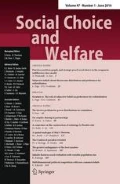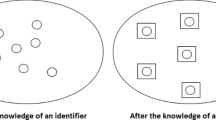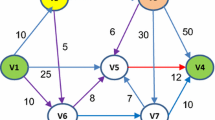Abstract
We present an extension of the overtaking criterion, called fixed-step overtaking social welfare relation (SWR), and its leximin counterpart, called fixed-step W-leximin SWR, for the evaluation of infinite utility streams. Our SWRs satisfy Fixed-step Anonymity. First, we characterize them by using the consistency, called Weak Fixed-step Indifference Consistency, which links indifference for infinite utility streams to indifference for their truncated vectors that are taken periodically. Second, we characterize another utilitarian extension, called \({\mathcal{S}}\)-overtaking SWR, by replacing the consistency with Fixed-step Anonymity. The \({\mathcal{S}}\)-overtaking SWR is a subrelation of the fixed-step overtaking SWR. Meanwhile, the leximin counterpart of the \({\mathcal{S}}\)-overtaking SWR coincides with the fixed-step W-leximin SWR, and we obtain its alternative characterization using Fixed-step Anonymity. Finally, we generalize the impossibility of combining Fixed-step Anonymity with the catching-up SWR by showing the Pareto and strong consistency axioms satisfied by the catching-up SWR come in conflict with Fixed-step Anonymity.
Similar content being viewed by others
References
Asheim GB, Banerjee K (2009) Fixed-step anonymous overtaking and catching-up. Int J Econ Theory (Forthcoming)
Asheim GB, Tungodden B (2004) Resolving distributional conflicts between generations. Econ Theory 24: 221–230
Asheim GB, Tungodden B (2005) Do Koopmans’ postulates lead to discounted utilitarianism?. University of Oslo, Mimeo
Asheim GB, d’Aspremont C, Banerjee K (2009a) Generalized time-invariant overtaking. University of Oslo, Mimeo
Asheim GB, Mitra T, Tungodden B (2009b) Sustainable recursive social welfare functions. University of Oslo, Mimeo
Atsumi H (1965) Neoclassical growth and the efficient program of capital accumulation. Rev Econ Stud 32: 127–136
Banerjee K (2006) On the extension of the utilitarian and Suppes-Sen social welfare relations to infinite utility streams. Soc Choice Welf 27: 327–339
Banerjee K, Mitra T (2008) On the continuity of ethical social welfare orders for infinite utility streams. Soc Choice Welf 30: 1–12
Basu K, Mitra T (2003) Aggregating infinite utility streams with intergenerational equity: the impossibility of being Paretian. Econometrica 71: 1557–1563
Basu K, Mitra T (2007) Utilitarianism for infinite utility streams: a new welfare criterion and its axiomatic characterization. J Econ Theory 133: 350–373
Bossert W, Sprumont Y, Suzumura K (2007) Ordering infinite utility streams. J Econ Theory 135: 579–589
Bossert W, Weymark JA (2004) Utility in social choice. In: Barbarà S, Hammond PJ, Seidl C (eds) Handbook of utility theory extensions, vol II. Kluwer, Boston, pp 1099–1177
Brock WA (1970) On the existence of weakly maximal programmes in a multi-sector economy. Rev Econ Stud 37: 275–280
d’Aspremont C (2007) Formal welfarism and intergenerational equity. In: Roemer J, Suzumura K (eds) Intergenerational equity and sustainability. Palgrave, London, pp 113–130
d’Aspremont C, Gevers L (2002) Social welfare functionals and interpersonal comparability. In: Arrow KJ, Sen AK, Suzumura K (eds) Handbook of social choice and welfare, vol I. North-Holland, Amsterdam, pp 459–541
Diamond P (1965) The evaluation of infinite utility streams. Econometrica 33: 170–177
Fleurbaey M, Michel P (2003) Intertemporal equity and the extension of the Ramsey criterion. J Math Econ 39: 777–802
Hammond PJ (1976) Equity, Arrow’s conditions, and Rawls’ difference principle. Econometrica 44: 793–804
Kamaga K, Kojima T (2009a) On the leximin and utilitarian overtaking criteria with extended anonymity. Mimeo, Waseda University, G-COE GLOPE II, Working Paper No. 9 (http://globalcoe-glope2.jp/uploads/mydownloads/GCOE_WP09.pdf)
Kamaga K, Kojima T (2009b) \({\mathcal{Q}}\)-anonymous social welfare relations on infinite utility streams. Soc Choice Welf 33: 405–413
Khan AM, Mitra T (2006) Undiscounted optimal growth in the two-sector Robinson-Solow-Srinivasan model: a synthesis of the value-loss approach and dynamic programming. Econ Theory 29: 341–362
Lauwers L (1997a) Rawlsian equity and generalised utilitarianism with infinite population. Econ Theory 9: 143–150
Lauwers L (1997b) Infinite utility: insisting on strong monotonicity. Aust J Philos 75: 222–233
Lauwers L (2009) Ordering infinite utility streams: maximal anonymity. Katholike Universiteit Leuven, Mimeo
Lauwers L (2010) Ordering infinite utility streams comes at the cost of a non-Ramsey set. J Math Econ 46: 32–37
Mitra T, Basu K (2007) On the existence of Paretian social welfare quasi-orderings for infinite utility streams with extended anonymity. In: Roemer J, Suzumura K (eds) Intergenerational equity and sustainability. Palgrave, London, pp 85–99
Sakai T (2009) Intergenerational equity and an explicit construction of welfare criteria. Yokohama National University, Mimeo
Sen AK (1970) Collective choice and social welfare. Holden-Day, Amsterdam
Suppes P (1966) Some formal models of grading principles. Synthese 6: 284–306
Svensson LG (1980) Equity among generations. Econometrica 48: 1251–1256
Szpilrajn E (1930) Sur l’extension de l’ordre partiel. Fundam Math 16: 386–389
van Liedekerke L (1995) Should utilitarians be cautious about an infinite future. Aust J Philos 73: 405–407
von Weizsäcker CC (1965) Existence of optimal programs of accumulation for an infinite time horizon. Rev Econ Stud 32: 85–104
Zame W (2007) Can intergenerational equity be operationalized?. Theoret Econ 2: 187–202
Author information
Authors and Affiliations
Corresponding author
Rights and permissions
About this article
Cite this article
Kamaga, K., Kojima, T. On the leximin and utilitarian overtaking criteria with extended anonymity. Soc Choice Welf 35, 377–392 (2010). https://doi.org/10.1007/s00355-010-0445-x
Received:
Accepted:
Published:
Issue Date:
DOI: https://doi.org/10.1007/s00355-010-0445-x




